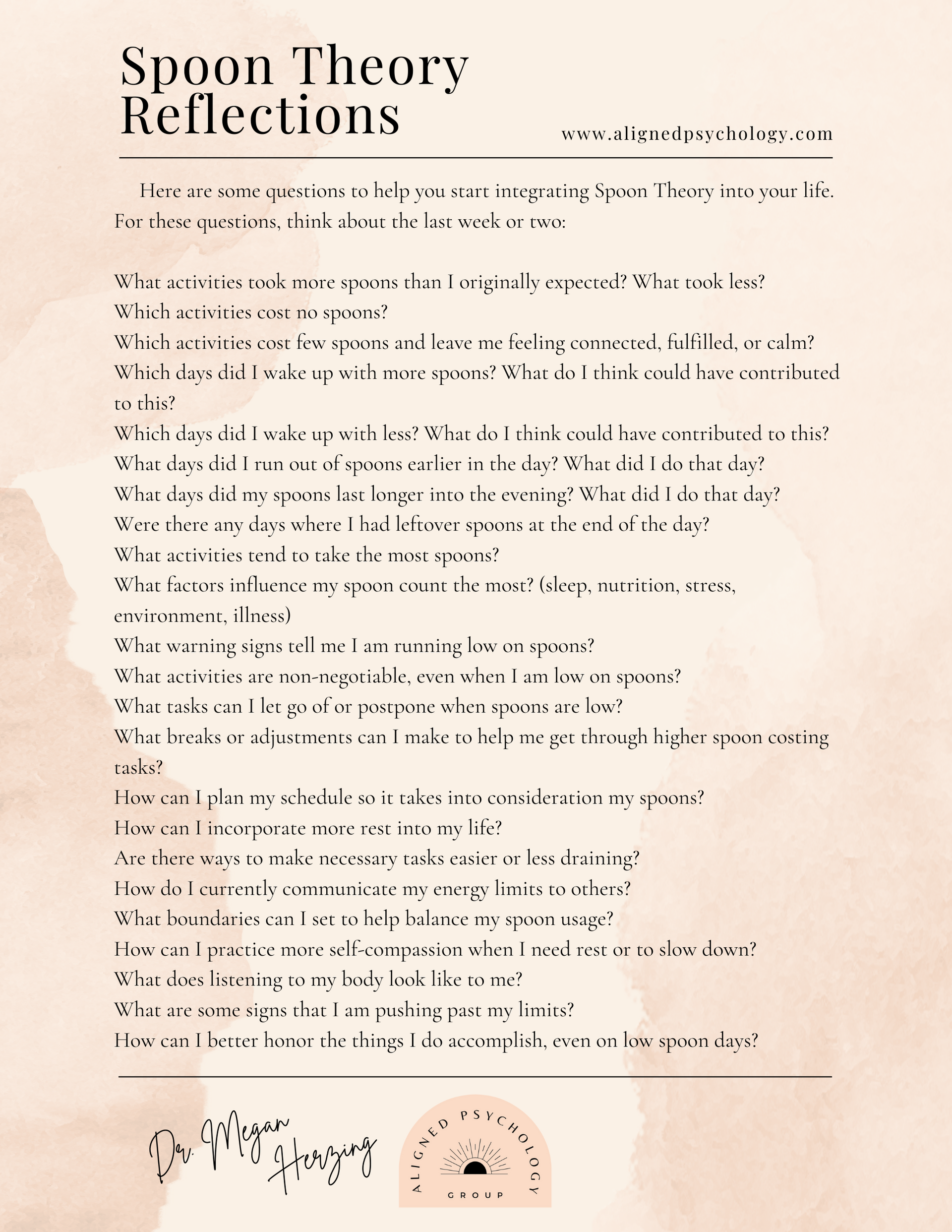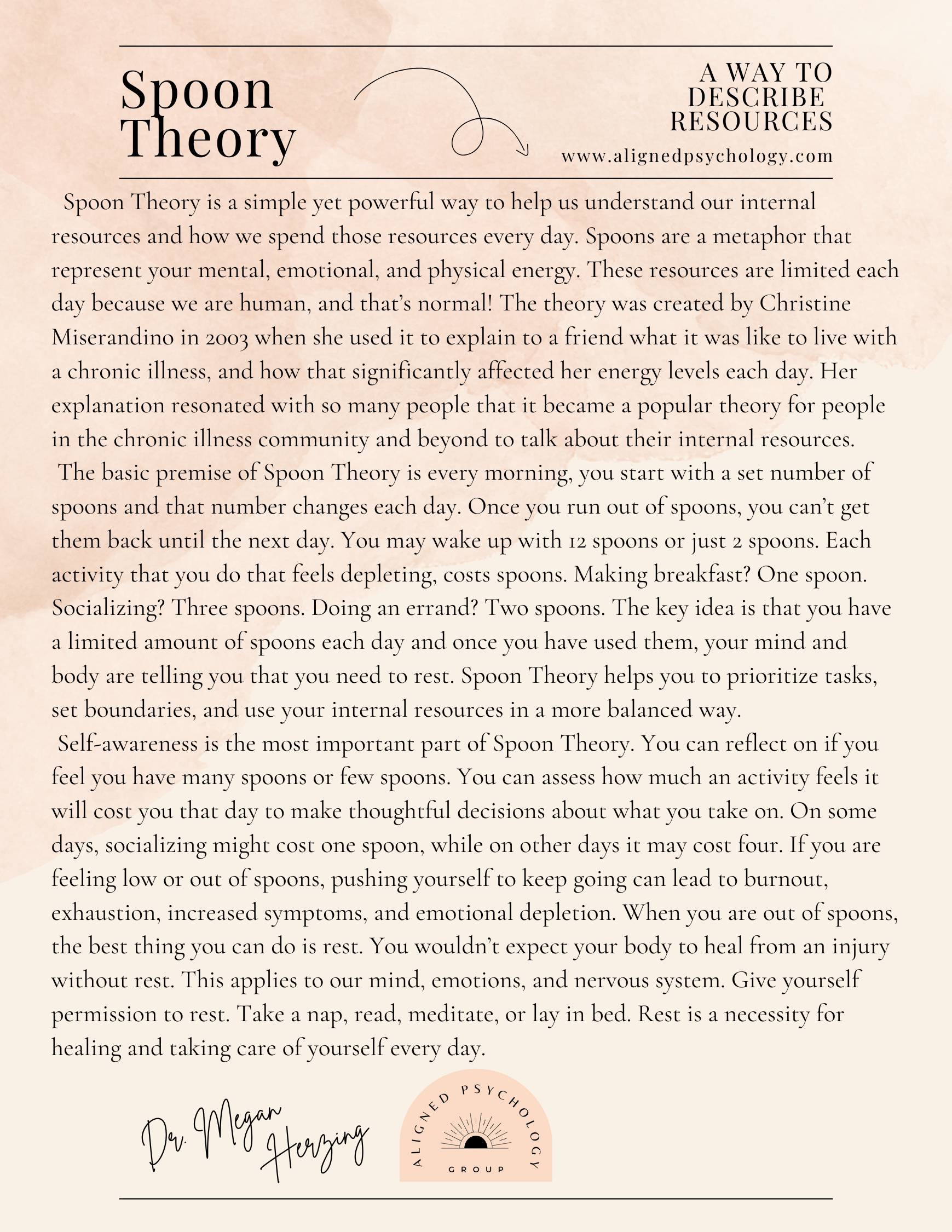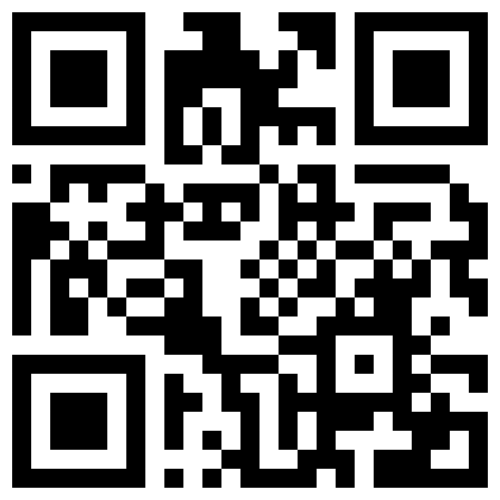Trauma Therapy Homework - Week 12
Week 12: (The Basics)
Spoon Theory
In trauma therapy, there’s often a lot of focus on how we manage our emotions, relationships, and stress levels. But what about how we manage our energy and internal resources? This is where Spoon Theory comes in—a simple yet powerful concept to help us understand how we expend energy throughout the day. And even though it originally came from the chronic illness community, Spoon Theory is something that can be useful to anyone. Let's break it down to help you understand what it is and how to use it in your life.
What Is Spoon Theory?
Spoon Theory was created by Christine Miserandino in 2003. She was trying to explain to a friend what it was like living with lupus, a chronic illness that can significantly affect your energy levels day to day. Christine’s story resonated with so many people, that Spoon Theory became a popular way for many people to talk about how they manage their energy and internal resources.
The basic premise of Spoon Theory is simple: imagine you start your day with a set number of spoons. Each spoon represents a unit of energy or internal resource you have available to you that day. It's like a battery. How much has your battery charged from the night before? You might wake up with 12, 5, or even 1 spoon depending on how you’re feeling. Every day, you get a different number of spoons. Every task or activity you do throughout the day that feels depleting costs spoons. Making breakfast? One spoon. Meeting with friends? Three spoons. Going to work? Two spoons. Spoons are like money. We have to pay for the activities that cost us energy with spoons.
This is where it can get a little complicated because the same activity does not cost the same amount of spoons each day. For example, maybe one day you feel rested, got good sleep, and had enough alone time. This day, meeting with friends costs one spoon because you feel resourced and have a higher capacity internally. Maybe on a different day, you worked all day, ran an errand, took care of someone else, didn't sleep well, and felt many of your needs went unmet. This day, meeting with friends costs 3 spoons, it takes more energy out of you and you feel less resourced and have decreased capacity. You will intuitively know when an activity feels like it costs you more or less. Try to approach this with nonjudgment. It is ok if an activity costs more or less on different days. That is normal and happens to all of us. Some days, going to work costs me two spoons. Other days, it costs 5. I notice my work day feels like it costs more when I have overbooked myself, am behind on notes, didn't sleep well, haven't engaged in self-care to the extent I want, or have something difficult or triggering going on in my personal life.
Here is the kicker. At some point in the day, you’ll run out of spoons.
We all do. Spoons are a limited resource. And once they’re gone, that’s it, you can’t get more until the next day. Spoons reset every morning when you wake up. The key idea behind Spoon Theory is that you only have a limited number of spoons each day, and once you’ve used them up, it is not helpful to your mind and body to keep going and pushing yourself when you are running on empty. This theory helps you to be more intentional about how you spend your spoons (energy) while understanding the importance of setting
boundaries, learning to
prioritize, and utilizing your resources without burning out.

Why Does Spoon Theory Matter in Trauma Therapy?
When we’re in trauma therapy, we’re not just working on our emotional recovery—we’re also figuring out how to balance all the demands of life, relationships, work, and self-care. This can be exhausting, and when we add the weight of trauma to that, it can feel like we’re constantly running on empty. Understanding Spoon Theory is helpful here because it gives us a way to understand and talk to others about our internal resources. If you’ve ever felt drained after a long day or found yourself overwhelmed by the demands of life, Spoon Theory can help explain why. Your spoons represent your mental, emotional, and physical resources, and they’re not infinite. Sometimes you need to recognize that you’ve used up all your spoons for the day—and that’s okay.
In trauma therapy, we often talk about the importance of pacing ourselves. Healing doesn’t happen all at once. Some days you’ll feel like you have more spoons to work with, and other days you’ll have less. That’s normal. But by understanding how Spoon Theory works, you can begin to reflect on how much energy you have available at any given moment, and use that awareness to make better decisions about what to do next.
Reflecting on Your Resources: How Much Do You Really Have?
There are a few ways to apply Spoon Theory to your life. The first is through self-awareness. By becoming mindful of how much energy you have available, you can start to make more informed choices about what you take on during the day. Reflection is one of the most important aspects of using Spoon Theory. Spend some time reflecting on your spoons each day. How many do you start with? What tasks deplete them? Do you notice certain activities, people, or situations that may drain you more than others? For example, you might find that a social event or a work meeting costs you more spoons than you anticipated while taking a walk in nature or spending time alone in quiet reflection might not. You don't have to get specific about the number of spoons for this to work. You don't need to track your spoons all day and say "I had 8, now I have 5." You can simply have an awareness "I am working with less spoons today. I am getting low on spoons. Or maybe, I need to cancel or say no to something because I don't have the spoons."
By understanding how your spoons fluctuate, you can better predict your needs and avoid overextending yourself. It means being more thoughtful about your resources so you don’t push yourself past your limits. Some days, your spoons will be in more abundance. You might feel energized and ready for the day. On those days, you can choose to use your spoons for more demanding tasks. But on other days, when your spoons are running low, it’s okay to take a step back, slow down, rest, and do less.
I want to acknowledge that for many people, having the option to conserve energy or avoid running on empty simply isn’t a reality. For single parents, caregivers, those supporting elderly family members, and people working multiple jobs, life can be relentless, demanding, and unforgiving. If this is your experience, please extend compassion to yourself for the season you’re in and the responsibilities you’re carrying.
Spoon Theory may not fully capture your experience, and that’s okay. You might find another framework that resonates more, or perhaps you can identify small moments or activities that don’t deplete your energy but instead offer nourishment, even in the midst of exhaustion. Whatever that looks like for you, know that your experience is valid, and you deserve care, too.
When You Run Out of Spoons: The Importance of Rest
We all reach a point where we run out of spoons. And here’s the hard truth: when that happens, you can’t keep going without potential consequences to your nervous system. Our brains and bodies are wired in a way where we can push past our limits for a short, acute, minimal period of time. But if it becomes chronic and long-term, our nervous system can be dysregulated. Pushing yourself to keep going after you’ve exhausted your internal resources can lead to burnout, exhaustion, and emotional depletion.
When you’re out of spoons, the best thing you can do is rest. It’s a sign that you’ve reached your limit for the day. In trauma therapy, rest is incredibly important because healing is a gradual process. Just as you wouldn’t expect your body to heal from an injury without rest, you can’t expect your emotional or mental health to improve without taking time to recharge. Give yourself permission to rest. Take a nap, read a book, meditate, lay in bed, or whatever helps you feel rested. Rest is not a luxury, it’s a necessity for healing and for taking care of your body every day. If it is an option for you, see how you can prioritize rest more in your life when your spoons feel depleted.

Using Spoon Theory to Communicate with Others
One of the most valuable things about Spoon Theory is that it gives us a framework to communicate with the people we’re close to. Sometimes, we may struggle to explain why we can’t do something, why we need to cancel plans, or why we’re feeling so drained. Instead of simply saying “I’m too tired” or “I’m feeling off,” if the person knows about spoon theory, you can say, “I’m out of spoons,” or “I’m really low on spoons today", or "I don't have the spoons for that today, maybe tomorrow."
When you use Spoon Theory in your conversations, it helps people understand that it’s not about laziness or lack of effort—it’s about your internal resources. The people who know you well can learn to recognize when you’re nearing the end of your spoons, and that may help them be more empathetic and supportive when you need rest. Healing is a long process, and sometimes we need to ask for help, space, or understanding from those around us.
So, if you’re working through trauma and finding yourself emotionally or physically drained, you can say, “I’ve had a tough week, and I’m really low on spoons today.” This way, you’re not just saying you’re tired; you’re giving them a clear picture of what’s going on internally. You’re communicating your need to rest and recharge without feeling like you need to justify your boundaries.

A Final Note
Spoon Theory is a powerful tool that can help you understand your internal resources and how to manage them in a balanced way. It gives you a simple way to communicate your needs to others, prioritize your energy, and make choices that support your well-being. By reflecting on your spoons, setting boundaries, and taking rest when you need it, you’ll be better able to navigate your healing journey with grace and self-compassion. So, as you move into week 12 of your trauma therapy homework, remember: it’s okay to be low on spoons. You are human! Be kind to yourself, recognize when you need rest, and use your spoons wisely. Healing is a marathon, not a sprint, and you’re doing an amazing job.
FREE Downloadable Handouts
Click this
LINK
for free access to downloadable PDFs from the Trauma Therapy Homework Series. You’ll be directed to my Google Drive folder, where you can explore all the handouts created so far. You can choose between a digital format for easy viewing on your device or a printable version if you prefer a hard copy.
Here is a preview of this week's handout! Click the link above to get your own free pdf copy.



ABOUT THE AUTHOR
Dr. Megan
Megan Herzing PsyD, Licensed Professional Clinical Counselor, specializes in trauma therapy and creating a safe, supportive space for healing. She integrates evidence-based modalities, including EMDR, Internal Family Systems (IFS), somatic therapy, and Emotionally Focused Therapy (EFT), to address the mind-body connection and empower clients on their journey to wellness. With extensive experience treating complex PTSD, anxiety, attachment injuries, and dissociation, she believes in the power of self-compassion and authentic connection to facilitate lasting change. Drawing from her own healing journey, she brings empathy and lived experience to her work, honoring each client’s unique path toward growth and resilience.
Thank you for being part of a community of humans that deeply cares about healing.
We are honored that you stopped by and hope our resources will continue to bring value to your life.
We are accepting new clients in California, and referrals are always appreciated.












